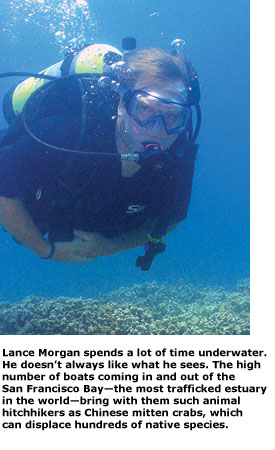 |
| |||
In October Lance Morgan(M.A.,'91) plunged underwater in a submersible vehicle to study a deep-sea coral reef off the coast of Cape Canaveral, Fla. He found the reef almost completely destroyed by bottom trawling, a practice of dragging large weighted nets across the seafloor to catch fish. "Coral and sponges [which support fish habitats] can live hundreds to thousands of years, so losing them to fishing is a loss to biodiversity ⦠an ecological tragedy," Morgan says. As chief scientist for the nonprofit Marine Conservation Biology Institute, Morgan uses his findings to curb destruction of natural habitats. On dry land, he lectures to federal agencies, conservation groups and policymakers on harmful fishing practices and dramatic shifts in marine mammal populations. Morgan recently co-authored "Marine Priority Conservation Areas: Baja California to the Bering Sea," a book which highlights 28 sites in need of protection from fishing along the Pacific Coast of North America. He has also helped introduce into Congress a bill aimed at protecting marine life. If passed, the Bottom Trawl and Deep-Sea Coral Habitat Act will protect deep-sea coral, sponge habitats and the fish species they support by restricting bottom trawling. Morgan, whose father was in the Navy, grew up near port towns. Swimming, surfing and scuba diving became second nature. He studied marine biology at the University of California, Santa Cruz before he earned his master's in marine science at SFSU. Professors Peggy Fiedler, Hal Markowitz and Tom Niesen helped spark his interest in conservation biology. During his scientific career, Morgan has not only studied creatures of the sea, he has also lived as one. In 1994 he spent nearly two weeks 60-feet underwater off the coast of Key Largo, Fla., in a 50-foot long, stationary metal canister. Morgan exited periodically to collect water samples as part of his research on coral reefs. His living quarters were cramped, moldy and damp. The experience was great, right up until Hurricane Gordon hit, he says, forcing an emergency decompression. "Decompression takes about 17 hours," he says, "and we had to swim back to the surface in 12-foot seas." | ||||










 Disenchantment Under the Sea
Disenchantment Under the Sea